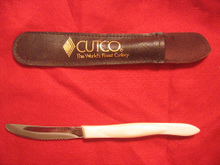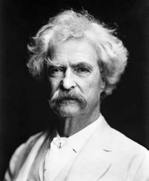Think of this as Volume 11, Number 23 of A-Clue.com, the online newsletter I’ve written since 1997. Enjoy.
We all have a little voice in our head saying "no, you can’t." (Picture from A Year in Pictures of Working.)
Sometimes we call it our mothers. This is unfair to mothers. It is, in fact, the voice of caution, even of reason. Caution is not always a bad thing.
But in our modern world caution needs to be put in its place. Sometimes it needs to be shut down entirely. Sometimes it needs to be transformed, through adrenaline, into that which gets us through.
I have been making a study of attitude most of my life, partly because I find it so hard to adjust my own. I get nervous in front of people, always have. I can’t shut down the voice. I admire those who can.
The earliest example I can offer is from the summer of 1975. I took a summer "job" selling knives, door to door. They were nice knives, I still have some. But I had no aptitude for it. I could not shut down the voices, and give myself the proper attitude.
There was one young person, of about my age, who could. Her name then was (yes it was) Candy Cotton. I remember her as short, wide-hipped, with long blond hair. And she never took no for an answer.
She was a great salesperson. She sold knives like no one’s business. I like to think she learned to sell other things, and had a happy life, marrying someone with a different last name. But in retrospect maybe that name was her great ally. Forcing people to get past it, and pointing them where she wanted them to go, may have been the necessary life-skill which made her the salesperson she was.
Since then I’ve met many salespeople, and while most never knew it I admired them all. It’s a tough life, sales. You are constantly facing the wall of "no," and you have to find a way to break it down. First in yourself, then in others.
One of the greatest salesmen I ever met was a man named Jay Abraham.
This was at the height of the Internet boom. Jay was trying to learn
the Internet, and so had invited some of us who were writing about
Internet marketing into his world.
He put together a 4-day event at an
LA Airport Hotel, and stayed for the whole thing. He said I did well,
probably because I was so certain of my subject I was able, for one
brief shining hour, to break through that attitude of "no." I later
learned it nearly killed me. (The stress demonstrated my high blood
pressure, and to this day I have to medicate it.)
What I remember most from that weekend, however, isn’t Jay. It was
what I called the "Jay people," the folks who paid big bucks to hear me
and my fellow Internet mavens tell them what they should have already
known. Some said they had gone to many Jay Abraham seminars, most of
which were one-man shows (Jay’s a great showman). Yet success still
eluded them.
The reason, in retrospect, was obvious. They were at a show, rather
than in the moment. They wanted some form of transference, for Jay’s
attitude to become their attitude, and for Jay’s instincts to become
their instincts. But they couldn’t break through that wall of caution.
Most of us can’t.
The attitude which lets you break through, or which lets the tension
of a moment wash over you, is a rare gift. You have to, in some ways,
live for a time outside yourself, see yourself as others see you, then
work from the outside to build that self up, and realize it’s still an
artifice.
No one does this as well as Barack Obama.
When he’s on a stage, taking applause, it’s with the attitude of "this
is what you have to do, y’all are applauding yourselves, and I’m giving
you permission to do that." It’s very much an actor’s gift. It was
Reagan’s gift. It was Roosevelt’s gift (both Roosevelts). It’s pure
salesmanship.
Because that’s the heart of branding, creating an attitude and following its course. As Rob Frankel
says, the idea of branding isn’t to make yourself well known, it’s to
make your brand the only choice for whatever that brand seeks to
represent. Even a small company can be a big-time brand, if its
managers know what it’s about, if they strive to meet those promises,
and if they’re consistent in matching their marketing to those
promises. You become the only choice.
Being the only choice is an attitude. Making yourself that only
choice takes hard work, and embodying it is a rare gift, a salesman’s
gift, a political gift.
What I’ve learned over time is this doesn’t have to be the exclusive
province of the rich and famous. Attitude, it turns out, can be a
multi-step process:
- Know who you are.
- Accept who you are.
- Deserve what you are.
- Be what you are.
Knowing who you are means discovering your strengths. Accepting who
you are means acknowledging your weaknesses and finding ways around
them. Deserving who you are is your own belief in yourself, and being
who you are is the result — going into the world with confidence.
Anyone can do it. It’s not magic. It’s simple maturation.
Late in his life, Mark Twain wrote in The Mysterious Stranger and
other works that maybe this life is a false front, a story we make up
of ourselves, no more real than the pages on a book. He wrote this near
the end of his life, when he could look back at many books and see one
Mark Twain, but look back at many failures and see the real Sam
Clemens.
It was in the 1890s, at the nadir of his personal and business
troubles, when he took on Twain as a character, and played him around
the world, and finally found what he’d been looking for. He found he
could write the story of his life by telling it, that Clemens had
become Twain, and even if Clemens was still plagued by self-doubt, Mark
Twain was a great man.
Don’t wait until you’re Twain’s age to learn this secret. Whatever
you are now, accept it, deserve it and be it. Strive to be better, but
know that everyone has that voice of "no" inside, but that doesn’t mean
you must obey it.
Attitude is a choice, and a well-made choice means success, regardless of what you do or what others choose to think of you.














